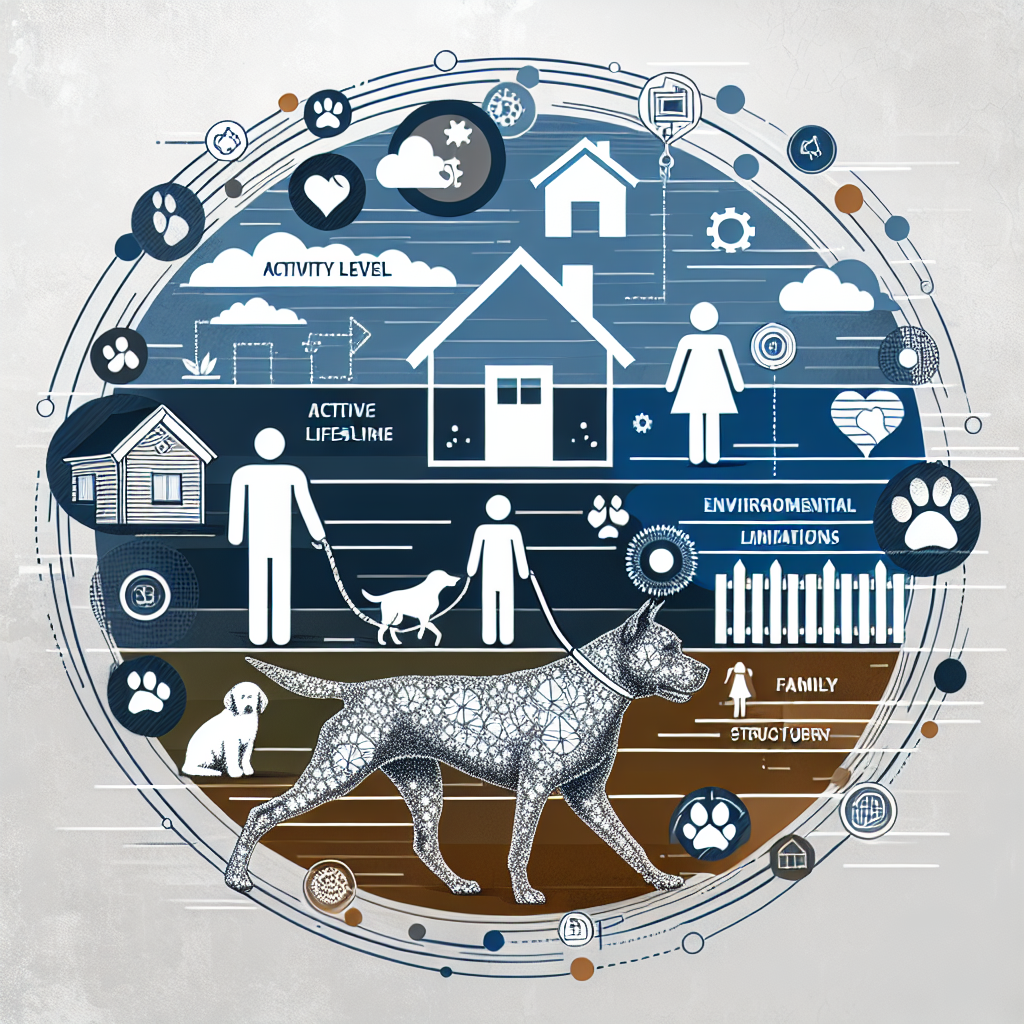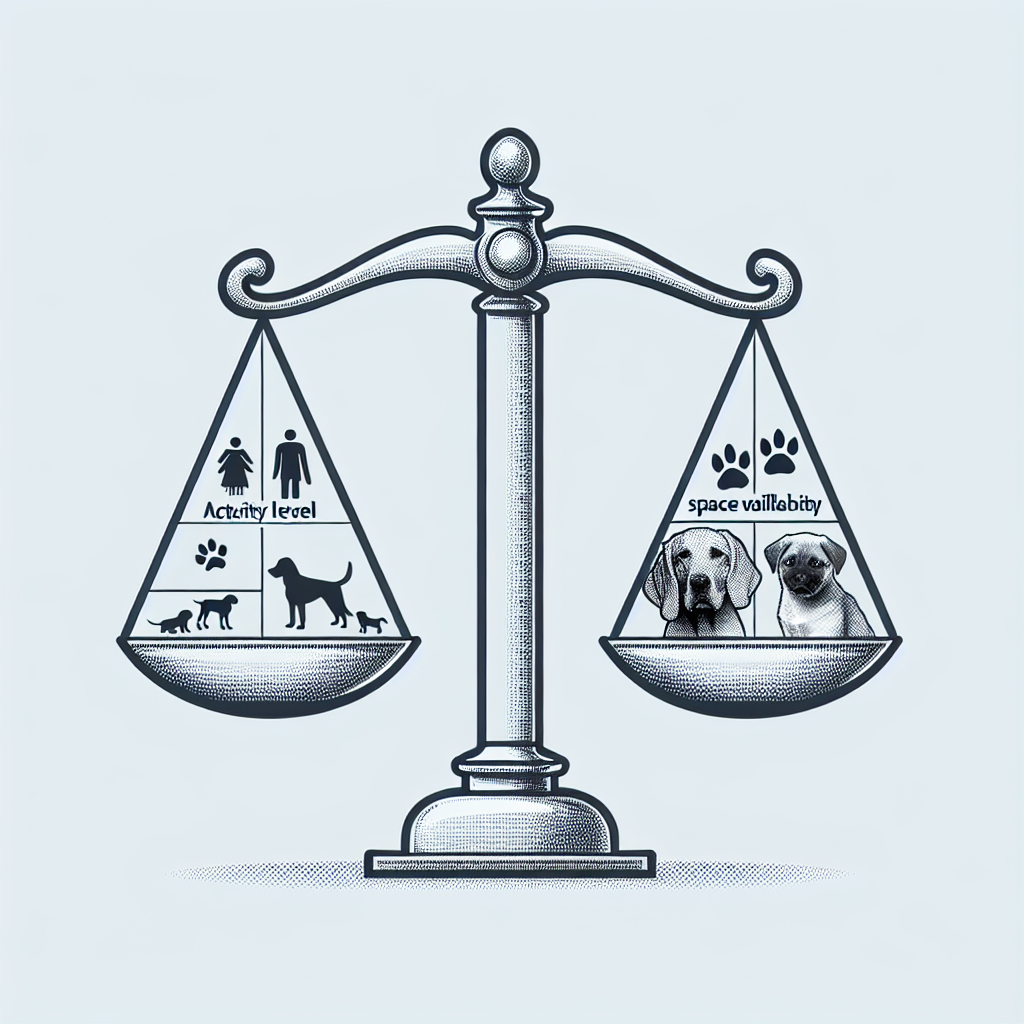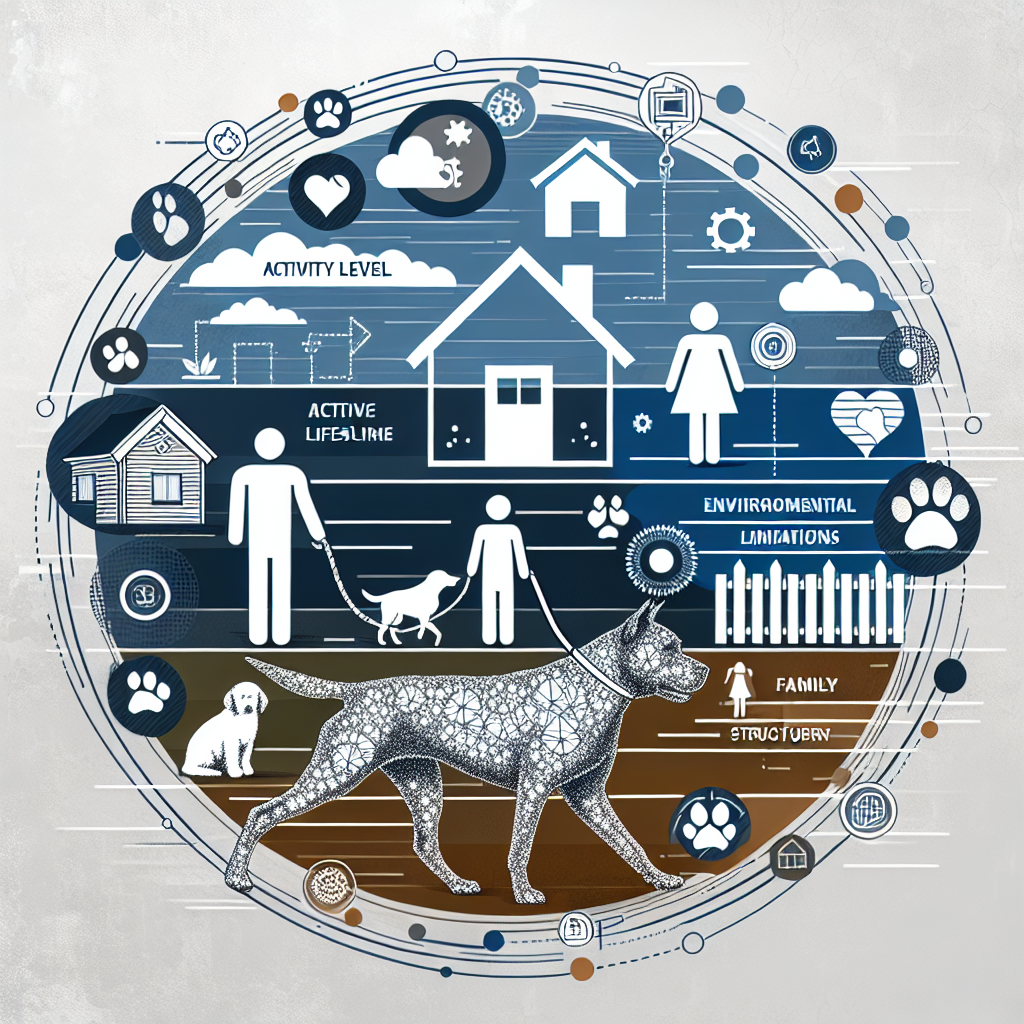Whether you’re a dog lover or considering adding a furry friend to your family, finding the right dog breed for your lifestyle is essential. With so many breeds to choose from, each with their own unique characteristics and needs, it can feel overwhelming to make the right decision. From energetic breeds that require lots of exercise to low-maintenance breeds that are more laid-back, understanding your lifestyle and the type of dog that will fit seamlessly into it is key. In this article, we’ll explore the factors to consider when choosing a dog breed, helping you find the perfect four-legged companion for you.
Consider Your Lifestyle
Activity Level
When choosing a dog breed, it’s essential to consider your activity level. If you live a sedentary lifestyle and prefer to spend most of your time indoors, a low-energy breed might be a better fit for you. On the other hand, if you lead an active lifestyle and enjoy outdoor activities such as running, hiking, or playing fetch, a high-energy breed would be more suitable.
Living Environment
Take into account your living environment when selecting a dog breed. If you live in a small apartment or have limited outdoor space, a smaller breed that doesn’t require much exercise may be the best choice. However, if you have a large yard or access to open spaces, you may consider a breed that thrives in more open environments.
Family Situation
Your family situation is another crucial factor to consider. If you have young children, you’ll want to choose a breed that is known for being good with kids. Some breeds have a natural affinity for children and are more tolerant and patient. If you have other pets at home, it’s important to consider a breed that is known to get along well with other animals.
Identify Your Needs
Companionship
If your primary reason for getting a dog is companionship, you’ll want to choose a breed that is known for its affectionate and loyal nature. Certain breeds are more inclined to be by your side at all times and provide constant companionship.
Guarding
If you’re looking for a dog breed that will serve as a guard dog, it’s important to choose a breed that is naturally protective and has a strong instinct to guard its territory and family. These breeds tend to be alert, fearless, and possessive of their loved ones.
Assistance
For individuals with special needs or disabilities, a dog breed that is trained to assist can be life-changing. Assistance dogs are carefully chosen for their intelligence, trainability, and ability to perform specific tasks that cater to a person’s unique needs.
Hunting
Hunting breeds are known for their exceptional scenting abilities, speed, and endurance. If you’re an avid hunter or enjoy outdoor activities like field trials or tracking, a hunting breed may be the ideal match for you.
Herding
Herding breeds have a natural instinct to control and move livestock. They are intelligent, obedient, and excel in various dog sports such as obedience trials and agility competitions. If you’re looking for a dog that can assist you with herding or enjoy participating in dog sports, a herding breed might be the right choice.
Sporting
Sporting breeds are highly energetic and excel in activities such as retrieving, swimming, and field trials. If you enjoy outdoor activities that involve a lot of physical exercise and mental stimulation, a sporting breed may be the perfect fit.
Working
Working breeds are known for their intelligence, strength, and versatility. They are often trained to perform tasks such as pulling sleds, search and rescue, or assisting the police. If you’re looking for a dog breed that can assist you in specific working activities, consider a working breed.

Size Matters
Small Breeds
Small breeds are ideal for those living in apartments or small homes with limited space. They are generally low maintenance and don’t require extensive exercise. Small breeds are also a great choice for individuals who prefer a dog they can easily pick up and carry.
Medium Breeds
Medium-sized breeds are a popular choice for families and individuals with moderately active lifestyles. They are usually adaptable and can adjust to both indoor and outdoor living environments. Medium breeds offer a good balance between energy levels and space requirements.
Large Breeds
Large breeds require more space and exercise compared to smaller breeds. They are well-suited for families with larger homes or access to outdoor areas. These breeds often have a calm and gentle nature, making them excellent companions for families with children.
Giant Breeds
Giant breeds are the largest dogs, and they require extensive living space. Their size is generally not suitable for small homes or apartments. While they may have a friendly and gentle disposition, their size alone can be intimidating for some individuals.
Grooming and Shedding
Low Maintenance
If you prefer a dog that requires minimal grooming, look for breeds with short coats that don’t shed excessively. These breeds typically only require occasional brushing and minimal bathing.
Moderate Maintenance
Breeds with moderate maintenance require regular brushing to prevent mats and tangles. They may also need regular bathing to keep their coats clean. Some breeds with moderate maintenance may have specific grooming needs, such as regular haircuts or ear cleaning.
High Maintenance
High-maintenance breeds often have long, luxurious coats that require daily brushing to prevent matting. These breeds may also require professional grooming and frequent bathing. If you’re willing to invest time and effort into grooming, high-maintenance breeds can be incredibly rewarding.

Allergies and Sensitivities
Hypoallergenic Breeds
Hypoallergenic breeds are an excellent choice for individuals with allergies or sensitivities to pet dander. These breeds produce fewer allergens and shed less, reducing the likelihood of triggering an allergic reaction.
Low Allergen Breeds
While not completely hypoallergenic, low allergen breeds are less likely to cause allergic reactions in individuals with milder allergies. These breeds may still produce some dander and shed, but at a lower level compared to other breeds.
Health and Exercise Needs
Potential Health Issues
Different breeds have varying predispositions to certain health issues. Research the potential health concerns associated with different breeds to ensure you can provide the necessary care and address any potential medical needs.
Exercise Requirements
Consider the exercise needs of different breeds before making your decision. Some breeds require moderate to high levels of exercise to stay healthy and happy. If you’re unable to meet a breed’s exercise needs, it can lead to behavioral issues and other health problems.
Temperament and Personality
Friendly and Sociable
Friendly and sociable breeds are known for their outgoing and welcoming nature. These breeds tend to get along well with strangers, other pets, and children. If you’re looking for a dog that will be a social butterfly, a friendly and sociable breed might be a perfect fit.
Independent and Reserved
Independent and reserved breeds are more inclined to be aloof and reserved. While they can still form strong bonds with their owners, they may not be as naturally outgoing or social with strangers. If you prefer a dog that is more independent and reserved, look for breeds with these traits.
Energetic and Playful
Energetic and playful breeds are always up for fun and games. They thrive in an environment where they can engage in regular physical and mental stimulation. If you’re an active individual who enjoys playtime with your dog, an energetic and playful breed will be an excellent addition to your family.
Calm and Gentle
Calm and gentle breeds are known for their relaxed and patient demeanor. They are often well-suited for families with young children or individuals seeking a dog with a more laid-back temperament. These breeds tend to be adaptable and can be comfortable in various living situations.
Territorial and Protective
Territorial and protective breeds have a strong instinct to guard their homes and loved ones. They are often vigilant and can be wary of strangers. If you’re looking for a dog that will provide a sense of security and protection, breeds with territorial and protective instincts are worth considering.
Training and Intelligence
Ease of Training
Some breeds are easier to train compared to others due to their high trainability and willingness to please. If you’re a first-time dog owner or prefer a breed that is quick to learn and obey commands, look for breeds known for their ease of training.
Intelligence Level
Intelligence levels can vary significantly among different dog breeds. Some breeds are highly intelligent and excel in tasks that require problem-solving and critical thinking. If you’re looking for a dog that can learn complex commands and be mentally challenged, consider a breed with a high level of intelligence.
Trainability
Trainability refers to a breed’s ability to learn and retain training commands. Breeds with high trainability are quick learners and respond well to positive reinforcement training methods. If training is a priority for you, choose a breed that is known for its trainability.
Breed Specific Considerations
Breed Characteristics
Each breed has its distinctive characteristics that make it unique. Research the specific characteristics of different breeds to ensure their personality, physical traits, and behavior align with your preferences and lifestyle.
Breed History
Understanding a breed’s history can provide insights into its original purpose and how it may have influenced its current characteristics. Research the history of different breeds to gain a better understanding of their background and what they were bred for.
Breed Reputation
Take into account a breed’s reputation and public perception. While not always accurate, a breed’s reputation can give you an idea of common stereotypes or generalizations associated with that particular breed.
Common Traits
Consider the common traits that a breed possesses. These traits can include energy levels, temperament, grooming requirements, and exercise needs. Making sure these common traits align with your lifestyle and preferences is essential when choosing the right dog breed.
Research and Consultation
Online Resources
There are many online resources available that can provide valuable information on different dog breeds. Websites and forums dedicated to dog enthusiasts and breed experts can be helpful in learning more about specific breeds and their suitability for different lifestyles.
Breed Clubs and Associations
Breed clubs and associations are excellent resources for connecting with breed enthusiasts and responsible breeders. They can provide first-hand knowledge about specific breeds, breed standards, and can offer advice on selecting a reputable breeder.
Veterinarians and Breeders
Consulting with veterinarians and professional breeders can provide valuable insights and guidance when choosing the right dog breed. Veterinarians can provide information on health concerns associated with different breeds, while responsible breeders can offer guidance based on their experience and knowledge of specific breeds.
Meet and Greet
If possible, arrange to meet and spend time with dogs of the breeds you’re considering. This will give you a chance to observe their behavior, temperament, and determine how well they align with your lifestyle and preferences. Additionally, meeting dogs in person can help you gauge compatibility and establish a connection before making a final decision.
In conclusion, choosing the right dog breed for your lifestyle requires careful consideration of various factors, including your activity level, living environment, family situation, and specific needs. By taking the time to research and consult with professionals and utilizing available resources, you can find a dog breed that will be a perfect match for you and your family. Remember, a well-informed decision will lead to a rewarding and lifelong companionship with your new furry friend.

